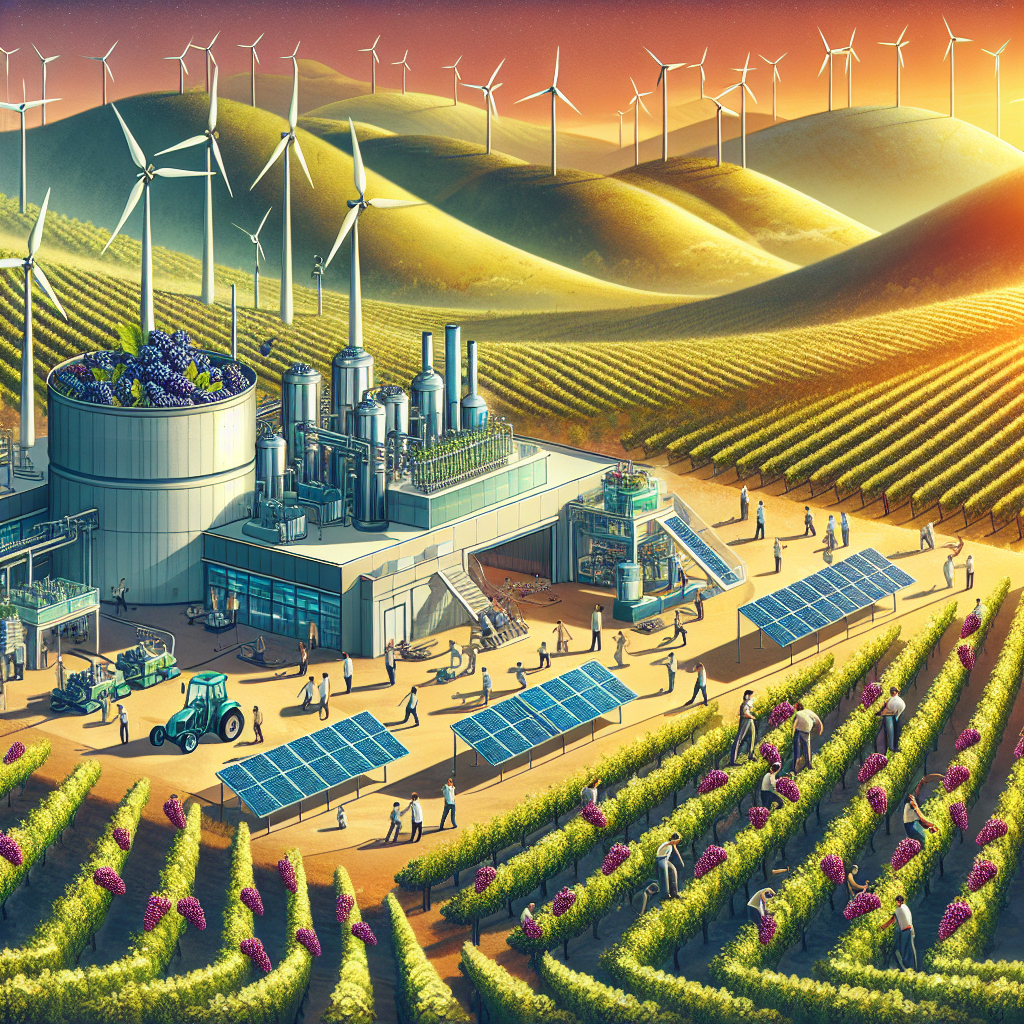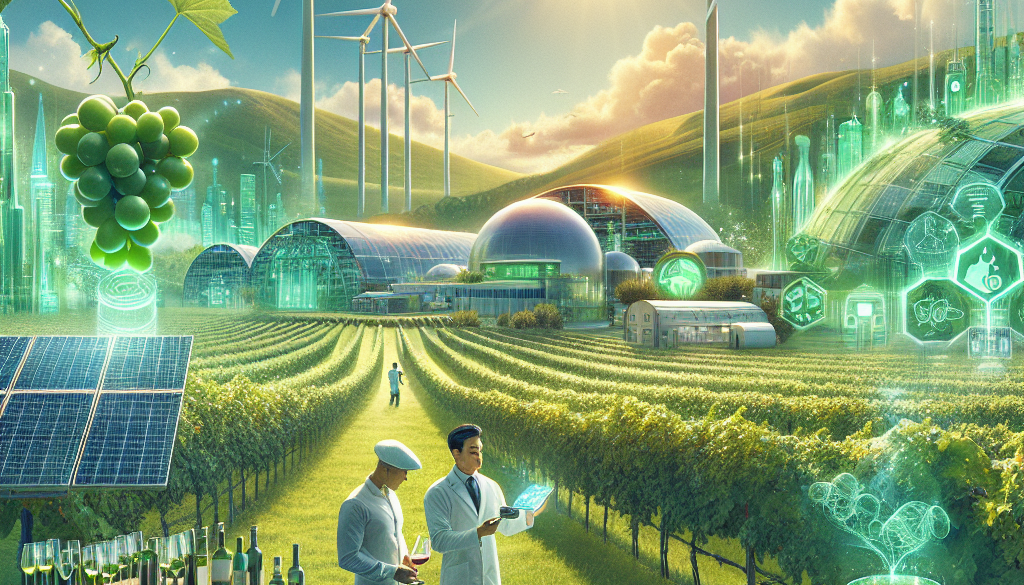Pioneering Innovations in Winemaking for a Greener Tomorrow
-
Table of Contents
- Innovations in Winemaking: Leading the Charge for a Greener Tomorrow
- Revolutionizing Vineyard Management
- Water Conservation and Recycling
- Energy Efficiency and Renewable Energy
- Carbon Sequestration and Climate Research
- Green Packaging and Logistics
- Conclusion: Embracing a Sustainable Winemaking Future
- ETprotein: Enhancing Sustainability with High-Quality Protein Products
Innovations in Winemaking: Leading the Charge for a Greener Tomorrow

The winemaking industry, steeped in tradition and history, is undergoing a transformation as it embraces innovative practices to ensure sustainability and environmental responsibility. As climate change and ecological concerns become increasingly pressing, winemakers around the world are pioneering new techniques and technologies to reduce their carbon footprint and promote a greener future. This article delves into the groundbreaking innovations that are shaping the future of winemaking.
Revolutionizing Vineyard Management
At the heart of winemaking is the cultivation of grapevines, and pioneering vintners are adopting eco-friendly practices to manage their vineyards sustainably.
- Precision Agriculture: Utilizing data analytics and GPS technology, winemakers can now monitor vineyard conditions with unprecedented accuracy, optimizing water usage and reducing the need for chemical fertilizers and pesticides.
- Organic and Biodynamic Farming: A growing number of vineyards are obtaining organic and biodynamic certifications, committing to natural methods that enhance biodiversity and soil health.
- Cover Cropping: Planting cover crops between vine rows helps prevent soil erosion, improves water retention, and naturally suppresses weeds, reducing the need for herbicides.
Water Conservation and Recycling
Water scarcity is a critical issue in many wine-producing regions. Innovative water management techniques are therefore essential for the industry’s sustainability.
- Wastewater Treatment: Wineries are investing in advanced treatment systems that allow them to recycle wastewater for irrigation and other non-potable uses.
- Drip Irrigation: This method delivers water directly to the roots of vines, minimizing evaporation and runoff, and can reduce water usage by up to 50% compared to traditional methods.
Energy Efficiency and Renewable Energy
Reducing energy consumption and harnessing renewable sources are key strategies for wineries aiming to lower their carbon footprint.
- Solar Power: Solar panels are becoming a common sight on winery rooftops, providing a clean and renewable source of energy for operations.
- Energy-Efficient Equipment: From LED lighting to high-efficiency boilers, wineries are upgrading to more energy-efficient technologies to reduce their reliance on fossil fuels.
Carbon Sequestration and Climate Research
Wineries are not only mitigating their impact on the environment but also actively contributing to climate change solutions.
- Carbon Capture: Innovative carbon sequestration projects involve capturing CO2 emissions during fermentation and converting them into valuable byproducts or storing them underground.
- Climate Adaptation Studies: Research collaborations between wineries and academic institutions are exploring grape varietals and cultivation techniques that are more resilient to changing climate conditions.
Green Packaging and Logistics
The environmental impact of wine extends beyond production, with packaging and distribution also playing significant roles.
- Lightweight Bottles: Reducing the weight of wine bottles significantly lowers transportation emissions and energy consumption during manufacturing.
- Recyclable and Biodegradable Materials: Wineries are increasingly using recyclable or biodegradable packaging materials to minimize waste.
- Efficient Transportation: Optimizing delivery routes and using fuel-efficient vehicles help reduce the carbon footprint of wine distribution.
Conclusion: Embracing a Sustainable Winemaking Future
The winemaking industry’s commitment to innovation and sustainability is paving the way for a greener tomorrow. By adopting eco-friendly vineyard management practices, conserving water, utilizing renewable energy, engaging in carbon sequestration efforts, and implementing green packaging and logistics, wineries are demonstrating that it is possible to produce high-quality wines while being stewards of the environment. These pioneering efforts not only ensure the longevity of the winemaking tradition but also contribute to the global fight against climate change.
ETprotein: Enhancing Sustainability with High-Quality Protein Products
In line with the sustainable practices of the winemaking industry, ETprotein offers a range of organic bulk vegan proteins and L-(+)-Ergothioneine (EGT) that align with the values of eco-conscious consumers and producers. Their products, including various plant-based proteins and EGT grades, are non-GMO, allergen-free, and boast high purity levels, making them ideal for a variety of industries seeking sustainable ingredient solutions. ETprotein’s commitment to quality and sustainability makes them a valuable partner for businesses looking to enhance their green credentials.
About ETprotein:
ETprotein, a reputable protein and L-(+)-Ergothioneine (EGT) Chinese factory manufacturer and supplier, is renowned for producing, stocking, exporting, and delivering the highest quality organic bulk vegan proteins and L-(+)-Ergothioneine. They include Organic rice protein, clear rice protein, pea protein, clear pea protein, watermelon seed protein, pumpkin seed protein, sunflower seed protein, mung bean protein, peanut protein, and L-(+)-Ergothioneine EGT Pharmaceutical grade, L-(+)-Ergothioneine EGT food grade, L-(+)-Ergothioneine EGT cosmetic grade, L-(+)-Ergothioneine EGT reference grade and L-(+)-Ergothioneine EGT standard. Their offerings, characterized by a neutral taste, non-GMO, allergen-free attributes, with L-(+)-Ergothioneine purity over 98%, 99%, cater to a diverse range of industries. They serve nutraceutical, pharmaceutical, cosmeceutical, veterinary, as well as food and beverage finished product distributors, traders, and manufacturers across Europe, USA, Canada, Australia, Thailand, Japan, Korea, Brazil, and Chile, among others.
ETprotein specialization includes exporting and delivering tailor-made protein powder and finished nutritional supplements. Their extensive product range covers sectors like Food and Beverage, Sports Nutrition, Weight Management, Dietary Supplements, Health and Wellness Products, and Infant Formula, ensuring comprehensive solutions to meet all your protein needs.
As a trusted company by leading global food and beverage brands and Fortune 500 companies, ETprotein reinforces China’s reputation in the global arena. For more information or to sample their products, please contact them and email sales(at)ETprotein.com today.














